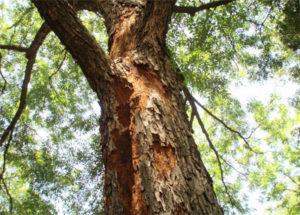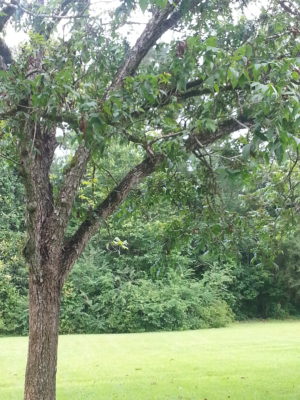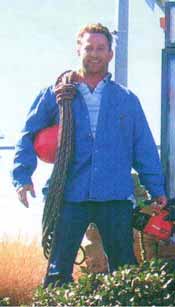What You Should Be Doing NOW for the Health of Your Trees!
What we are doing right now for our most astute clients is namely Deep Root Feeding (Feeding) and Insect Treatments. Deep Root Feeding
Experts tell us that some 90% of the nutrients in our soils has been stripped versus the nutrients that were in the soils as recently as 100 years ago. Many trees may look fine (without Deep Root Feeding) however; throw an exceptional hardship at them (wind-storms, ice accumulation from Freezing Rain, a hard, extended Deep Freeze like we saw mid-February last year) and the tentative health of so many trees is revealed: Death, entire trees toppling over and/or major-limb failures; etc.As an example; resulting from the “Deep Freeze” of last February; I would estimate that 5%-10% of Live Oaks were lost; 20%-30% of Ash trees were lost and 90% of Chinaberry trees were lost. In contrast, many of our Clients commented, and commended our work of Deep Root Feeding, saw their trees survive, with flying colors, when so many of their neighbors’ trees were lost.
When trees have their basic resource needs met; they tend to fare far better. A reasonable investment in our professional Deep Root Feeding may pay you substantial dividends.
Insect Treatments

 Many insect pests, such as Pecan Phylloxera, begin their malicious work very early in the growing season. In the case of Pecan Phylloxera, and other insects; they begin infesting the foliage of the trees the moment the leaves come out. And so, it is critical that we medicate the tree(s) before the insects can get started.
Many insect pests, such as Pecan Phylloxera, begin their malicious work very early in the growing season. In the case of Pecan Phylloxera, and other insects; they begin infesting the foliage of the trees the moment the leaves come out. And so, it is critical that we medicate the tree(s) before the insects can get started.Pecan Phylloxera is an insect pest which cause galls (bumps, pimples, tumors) on the foliage. These galls prevent the foliage from doing its job of Photosynthesis, and thus places a heavy burden on the trees’ food-producing resources. A moderate to heavy infestation of Pecan Phylloxera causes the Pecan trees to drop their leaves early, and often, making a mess below and more importantly; hazards the health, vigor and defense of the Pecans; not to mention diminish, if not completely halt fruit production.
Fruit production is the first thing trees will toss from their “budget” if resources are scarce.
I would estimate that 40%-50% of Pecan trees in the Dallas area are suffering from Pecan Phylloxera infestations.
I recently had two important Clients whose Pecan tree(s) we are treating, comment on how vigorous and healthy their Pecan tree(s) have been since we began their treatments for Pecan Phylloxera. They both also were thrilled to report that for the first time in years; their Pecans have resumed their fruit production; and that unlike so many years before; that the fruit was healthy.
Other common insects for which it is important to get an early start on control measures, include Oak Gall, Gouty Gall, Leaf Gall, Leaf-Margin Gall, Twig-Girdling Gall (all commonly active in Oak trees). Hackberry trees (which in most cases are actually Sugarberry trees), should you happen to have a well-placed, well-formed Hackberry which you wish to care for, are also notoriously afflicted with Leaf-Gall. These Leaf-Gall-forming insects are also highly suspect in the poor-health of so many Hackberry trees in the area. There are many other insects afflicting our valuable trees; too many to list here; in which it is important to get an early start in their control.
Our most common form of Insect Treatment is also the least costly among all the treatments we provide, provides effective control of 85%+ of all insects commonly afflicting our trees, and is a once annual treatment.
Call White Rock Tree Wizards today to schedule your Tree Care Assessment, and get your trees off to a vigorously healthy, beautiful start this season. Call Tree Wizards at 972-803-6313 or email your request to Jim@ArborWizard.com. See you soon!



